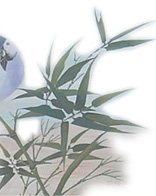|
 LISTEN TO THE TEXT LISTEN TO THE TEXT LISTEN TO SHIRLEY TO SING THE POEM LISTEN TO SHIRLEY TO SING THE POEM
 Hi, friends, today I would like to introduce a new Chinese classical poem Wuti -- No Title by Tang Dynasty (618- 907) poet Li Shangyin. Hi, friends, today I would like to introduce a new Chinese classical poem Wuti -- No Title by Tang Dynasty (618- 907) poet Li Shangyin.
Li Shangyin was the greatest poet in the later period of Tang Dynasty. He was a successful candidate in the highest imperial examinations when he was 25 years old. He fell over himself for polity and some innovation. However, just in the cruel political struggle, he was excluded and his political dreams could not be true until he was dead when he was only 45 years old with a poor life, chill and depressed heart...
Anyway, maybe for his sad life experience, made Li Shangyin became a famous representative poet in the later period of Tang Dynasty. He had a same reputation as Du Mu and be called "Little Li Du" (The big âLi Duâ is Li Bai and Du Fu) but he had more and bigger effect to the poets and their create in his times and the following Chinese poetry history. Now there are more than 600 poems by him in the world. The highest accomplishment of his is LĮ Shi -- a kind of poetry with eight lines, every line 5 or 7 words with different tones and rules -- if every line has 5 words and 8 lines is Wuyan LĮshi; if every line has 7 words and 8 lines is Wuyan LĮshi:-)
Li Shangyin wrote many poems with titles of "Wuti" ? No Title. This poem that I chose for you today is famous for its first 4 lines and I would also just like to introduce the first 4 lines for you. It expresses the sincere love of people. Now the last 2 lines were used on many places in Chinese cultures to admire the people who love and be in loyalty to their feelings, careers, nations and so on.
As usual, I wrote a piece of music for it and also I played and sang it for you and hope it is a little help to you to know something more about Chinese culture and language.
Note: You are welcomed to hit any Chinese word that you need to help to see its Chinese pinyin, meaning, pronunciation and follow me to read it.
MAIN MEANING OF THE POEM LISTEN TO SHIRLEY TO SING THE POEM LISTEN TO SHIRLEY TO SING THE POEM
No Title
It's hardly possible to meet you for awhile,
It's more hardly possible to leave from you.
In the later spring breeze,
All of the leaves of flowers are flying to the ground.
My love to you is just as a spring silkworm,
never stops to spin her threads until she is dead,
and also like a burning candle,
never stops her tears until she becomes to be ash...
 Translated By Someone Else Translated By Someone Else
Time was long before I met her,
but is longer since we parted,
And the east wind has arisen
and a hundred flowers are gone,
And the silk-worms of spring
will weave until they die,
And every night the candles
will weep their wicks away.
Mornings in her mirror
she sees her hair-cloud changing,
Yet she dares the chill of moonlight
with her evening song.
...It is not so very far to her Enchanted Mountain
O blue-birds,
be listening!
-Bring me what she says!
CHINESE CHRACTERS AND PINYIN LISTEN TO SHIRLEY TO SING THE POEM LISTEN TO SHIRLEY TO SING THE POEM
æ éĒ
įļč§æķéūåŦäšĶéū -- xiÄngjià n shà nÃĄn biÃĐ yÃŽnÃĄnïž
äļéĢæ åįūčąæŪ -- dÅngfÄng wÚlÃŽ bĮihuÃĄ cÃĄn ã
æĨčå°æŧäļæđå°― -- chÅŦncÃĄn dà o sĮ sÄŦ fÄng jÃŽnïž
čĄįŽæį°æģŠå§åđē -- là jÃđ chÃĐnghuÄŦ lÃĻi shĮ gÄnã
æéä―æäšéŽæđ -- xiaojin dan chou yunbin gaiïž
åĪååšč§æå
åŊ -- yeyin yingjue yueguang haiã
čŽčąæĪåŧæ åĪč·Ŋ -- penglai ciqu wu duo luïž
ééļæŪ·åĪäļšæĒį -- qingniao yinqin wei tankanã
That is all for this poem. Hope you enjoy it. :-)
Note: You are welcomed to hit any Chinese word that you need to help to see its Chinese pinyin, meaning, pronunciation and follow me to read it.
 If you have any questions, comments and suggestions, please write to shirley@ebridge.cn , or shirleyz004@yahoo.com, You are welcomed. If you have any questions, comments and suggestions, please write to shirley@ebridge.cn , or shirleyz004@yahoo.com, You are welcomed.
--Shirley
Written, Edited and Recorded on Sun, Jan 8, 2006
|

